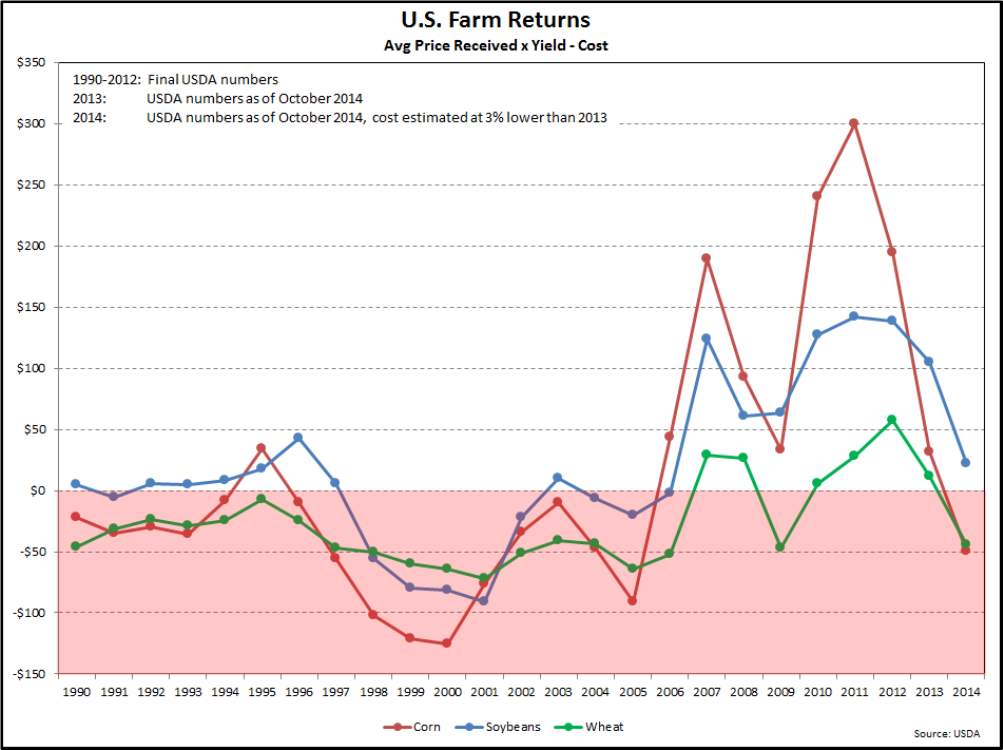Making a Game Plan for Farm Marketing
This time of year, with football games aplenty, basketball games on 27 out of 32 channels, and baseball just around the corner, inspires this simple...

Understanding the idea of Minimum Price Contracts
o When offering MPC as a farm marketing alternative, the elevator is NOT buying call options for the farmer, but rather for itself to cover potential obligations to the farmer. The elevator is buying a call option as a vehicle that enables the elevator to buy the farmer's grain (which locks in the lowest price he can receive for those bushels) and leaves open the potential to receive any increase in the futures market above a predetermined price, in a certain period of time, for an agreed upon fee.
o As such, merchandisers must use care in explaining the elements of the MPC contract to the producer. The cash part of the transaction is consummated when the Minimum Price is established by buying the cash grain and selling futures. This part of the contract is identical to any cash grain purchase, fixes the basis for the elevator and a cash floor price for the producer. Period. That’s the end of the cash part of the transaction. The producer ceases to watch the cash market as a means of determining the outcome of the contract.
o The potential for the producer receiving any increase in the futures market comes from the call option that the elevator buys to support the MPC with the producer. The premium that the elevator pays for the call option is charged to the producer as a cost for receiving the floor and any increase in the futures market. This fee may be invoiced, if ahead of harvest, or deducted from the grain settlement when the cash grain is delivered.
o These contracts have been referred to as “a floor and maybe more”. The farmer has a tendency to focus on the “more” and underestimate the value of the “floor”. Merchandisers will have fewer disgruntled farmers by emphasizing the value of the floor, instead of a way of staying in the market. MPC should be viewed as price insurance, guaranteeing a minimum price, as opposed to a ticket to receiving an increase in the market.
o Some producers prefer to self-insure and shoulder the downside risk themselves, choosing to stay in the cash market using storage or DP. For producers comparing DP or storage with MPC Contracts, depending on basis and your DP or storage charges, the cost comparison could vary, in some cases favoring Price Later and in some cases MPC, so care should be taken to focus on the value of the floor and let the customer choose his preferred contact.
o Merchandisers must carefully explain the re-pricing part of the contract. The producer needs to watch only the futures market, not the cash market. Explain that he or she receives the increase above a predetermined futures price of an agreed upon futures contract, penny for penny, and has one opportunity to choose the increase on a given quantity of bushels. Avoid using option terminology when talking with the farmer. Strike price is a base futures price; the option premium is a fee; avoid talking about intrinsic value, time value, volatility, etc. This method will make the contact understandable to a broader cross section of your customer base.
o Buy cash grain, sell futures in the appropriate month, just like you would for a cash or forward purchase contract.
o Show the producer the fees for setting a floor and staying in the market for different periods of time, using option strike prices near to the current market. You may give him the choice of picking a strike price above the market, which in effect gives him a higher “deductible” and lower cost.
o Ask the farmer for a target to re-price. The producer has made one decision by setting the floor and will find it difficult to make another by watching the futures prices move around but will find it easier to procrastinate. Getting a target up front makes the re-pricing easier for both elevator and farmer and may lock in profit that could erode before the expiration date.
o When the farmer decides to capture an increase in the futures market, sell an appropriate number of the appropriate futures in your option account, in a minimum of 1000 bushel increments. The producer need not re-price the entire contract at once, but may enter targets at various levels for various quantities.
o At expiration date, if the option has any value, exercise the option and receive a long future position which will offset any short futures sold.
These contracts are most popular with folks who value having a floor price set and/or need money at harvest time. The success of offering Minimum Price Contracts to your producers will be directly affected by your ability to explain them properly and to condense the elements of the contract into simple terms.

This time of year, with football games aplenty, basketball games on 27 out of 32 channels, and baseball just around the corner, inspires this simple...

1 min read
If there is anything that the past several seasons of farming has taught us, it’s that there is indeed nothing new under the sun. Looking back, the...

1 min read
It seems like each crop year that comes around brings new types of contracts with new promises. Of course, the years of low prices that make it...